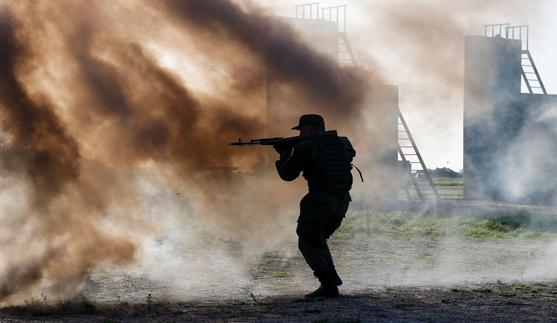By Manal Banana
After years of conflict between various factions throughout the oil-rich nation, the United Nations on Friday hailed the signing of a long-awaited Action Plan to withdraw mercenaries, foreign fighters, and foreign forces from Libya. Due to the collapse of Muammar Gaddafi's regime in 2011, Libya became a massive arena for the spread of arms and irregular armed groups, which strengthened their presence and strength by relying on fighters from outside Libya as a way of making a living or through recruitment operations based on ideological and political motives, taking advantage of great financial capabilities ruled by the Gaddafi regime. Given the central state's authority's vulnerability.
 Ján Kubi, Special Envoy and Head of the UN Support Mission in Libya (UNSMIL), called the agreement "another major success by the Joint Military Commission". This latest political breakthrough came at the end of a three-day conference at the United Nations in Geneva, when military officials from the government and opposition forces, known as the 5+5 Libyan Joint Military Commission (JMC), agreed on and approved the Action Plan. It is meant to serve as a basis for the progressive and balanced withdrawal of mercenaries, foreign fighters, and foreign forces from Libyan property. According to a UN report issued on Monday, mercenaries and other forces from outside Libya have been operating within the country for years, including individuals previously active in the Syria conflict and mercenaries allegedly recruited by the Russia-based Wagner group. The Action Plan is a national instrument, in agreement with last year's Ceasefire Agreement, UN Security Council resolutions, and the conclusions of the Berlin Conference. The UN described it as "important to supporting Libyans in achieving their sovereignty and integrity, as well as maintaining their country's peace, stability, and security."
Ján Kubi, Special Envoy and Head of the UN Support Mission in Libya (UNSMIL), called the agreement "another major success by the Joint Military Commission". This latest political breakthrough came at the end of a three-day conference at the United Nations in Geneva, when military officials from the government and opposition forces, known as the 5+5 Libyan Joint Military Commission (JMC), agreed on and approved the Action Plan. It is meant to serve as a basis for the progressive and balanced withdrawal of mercenaries, foreign fighters, and foreign forces from Libyan property. According to a UN report issued on Monday, mercenaries and other forces from outside Libya have been operating within the country for years, including individuals previously active in the Syria conflict and mercenaries allegedly recruited by the Russia-based Wagner group. The Action Plan is a national instrument, in agreement with last year's Ceasefire Agreement, UN Security Council resolutions, and the conclusions of the Berlin Conference. The UN described it as "important to supporting Libyans in achieving their sovereignty and integrity, as well as maintaining their country's peace, stability, and security."
The JMC 5+5 is establishing an implementation mechanism that calls for the gradual, balanced, and sequenced withdrawal of all mercenaries, foreign fighters, and foreign forces. The JMC 5+5 aims to communicate with relevant international partners, particularly Libya's neighbors, in order to gain their support and help the plan. The UN welcomed the JMC members' "patriotism and commitment" and urged them to "seize this opportunity" to achieve the full integration of the Ceasefire Agreement through this Action Plan. The UN stand prepared to support Libyan efforts to execute the agreed-upon Plan, as well as to unite military institutions and start disarmament, demobilization, and reintegration (DDR) and security sector reform (SSR) procedures in the country.
Geneva International Centre for Justice (GICJ) strongly supports the UN plan to withdraw mercenaries in order to achieve security and peace in the country. Having mercenaries in the country causes only danger to the country's and threat political future. We commend the UN for the plan that put to support the peace in Libya. GICJ recommends that the government and authorities collaborate with the UN to make mercenaries withdrawal as soon as they can to have peace and safety since the country will have elections soon to avoid any violence and conflict.
Justice, Human rights, Geneva, geneva4justice, GICJ, Geneva International For Justice









